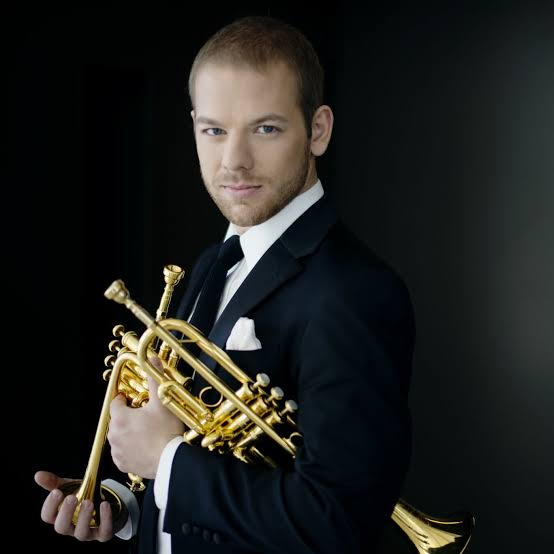by Stephanie Manning

“You kind of have to clear your schedule in terms of your repertoire,” Hudson said in a recent interview. “Not only does it take a lot of time to develop that endurance, but it’s just such a specialized piece that requires so much energy — it’s so nerve wracking.”
But Hudson loves the challenge, and Brandenburg No. 2 has become one of his signature pieces. The trumpeter has performed it with orchestras around the country and during the decade he spent as a member of the Canadian Brass. And he’s once again putting his Olympic training plan in action, as he gears up to perform the work with Apollo’s Fire on October 18, 19, 20, and 22.
The Baroque orchestra’s season-opening program also includes two other Brandenburg Concerti: No. 4 (featuring violinist Alan Choo) and No. 6 (featuring violists Nicole Divall and Min-Young Kim). Hudson will not appear on the October 21 performance, where his piece will be swapped with Bach’s Orchestral Suite No. 3. Tickets are available online.
The demands that Brandenburg No. 2 places on its soloists are so high, sometimes players decide it’s best to avoid it. “When trumpet players win a position as principal trumpet of a modern symphony orchestra, a lot of times they have it in their contract that they can’t be asked to play it, just because it’s so demanding,” Hudson said.
Despite the challenges, Hudson has embraced the work. “I love it,” he said. “Maybe I just enjoy the pain,” he added, laughing.
That pain is even more acute given that Hudson will be using a natural (Baroque) trumpet in the Apollo’s Fire concerts, rather than the modern piccolo trumpet. With no valves, longer tubing, and other barriers to accuracy, the natural trumpet makes this devilishly difficult piece even more so.
“When I first started playing the Brandenburg on piccolo trumpet, I felt like it was the hardest thing I ever had to do. And then I started learning natural trumpet, and it made piccolo trumpet seem like a piece of cake,” Hudson said.
Still, he now prefers the more difficult option. “Being able to play it the way that Bach intended, and hearing it in that context — it blends so well with the other instruments.”
He’s particularly thrilled to be playing with Apollo’s Fire for the first time, calling the group “legendary.” This isn’t his first time collaborating with music director Jeanette Sorrell, though.
“I know just from working with her, and the recordings that I’ve heard of Apollo’s Fire, that it’s going to be full of energy,” he said. “There’s a certain groove that Apollo’s Fire brings to Bach’s music that I really can’t wait to be a part of.”
The schedule of six performances — four in Ohio, two in Chicago — over the course of just nine days is testing the limit of what Hudson has done before. During his downtime, “I’ll be in the hotel just, like, icing my lips all day,” he joked.
Still, he’s looking forward to pushing himself. “Part of the reason that I said yes to this, even though it is probably one of the most challenging things in my career so far, is for the challenge itself,” he said. “I’ve always liked to push myself to the edge of what I thought was possible.”
For audience members, he added, the difficulty of the piece can also be part of the appeal. “Part of the magic of going to see it is not just the beauty of Bach’s writing, and the beauty of hearing it on period instruments, but the challenge of seeing the trumpet player struggle and hopefully overcome.”
Despite the Olympic-level intensity of his practice, Hudson wants his performance to tell a different story. “The goal for me is to not seem like I’m exerting myself too much,” he said. “We’ll see.”
Published on ClevelandClassical.com October 13, 2024.
Click here for a printable copy of this article


